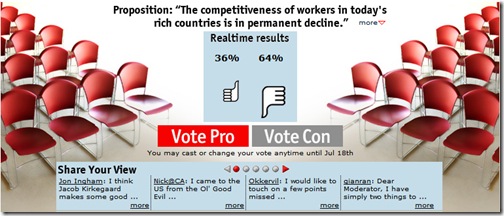In my last post (
The Search for Meaning), I wrote about the first approach to developing
mojo: the development of a compelling strategy based upon a key purpose that is internally rather than externally generated.
I think the second approach is to develop a complementary theme to the main focus - one that is not directly related to achieving the organisation's mission (like leadership, innovation etc), but can act alongside this to provide meaning and focus.
An obvious opportunity is to develop a focus on CSR and in particular on green business / HR. But for this to serve as mojo, this complementary focus needs to be really high profile and to perculate through everything that the organisation does.
The term, green HR, is often used to simply to make existing HR services and approaches sound more strategic or innovative, or to very small changes in policy. But I think it can be a lot more too.
The issue is that for a lot of organisations, their main environmental footprint is caused by the action of their employees, rather than in manufacturing, transportation or other activities with a more recognised environmental impact. And even in manufacturing and other industries, employee behaviours will still have a significant impact.
So the fact that many employees who have high green standards for themselves at home don't apply the same requirements to themselves at work (only 40% of employees think that it's our responsibility to protect the environment during office hours) is a problem.
Green HR to me is about how employees can be encouraged to change their behaviour, supporting and potentially leading the wider environmental management changes within organisational.
I attended a Deloitte dbrief webinar, 'Going Green', recently. This identified a dual role for HR in promoting sustainability.
First, there is the role HR plays in driving results through its own activities:
- "How do we compete for talent?
- Gen Y? OMG!?!
- What do employees care about?
- How can green engage employees?
- Is green helping deliver on my employer brand promise to employees?"
I think this role relates to often fairly simple changes in policy, most often associated with recruitment and reward, and also often geared to taking advantage of national / European or other legislation. An example would be B&Q stores offers discounted rates for home energy monitors (as an employee benefit).
And second, HR also supports green business by acting as a strategic partner to the business in this area:
- "What does sustainability mean to the business?
- Are people aware of our sustainability vision / results?
- Are our sustainability efforts enhancing our reputation?
- How do we reward people who 'go green'?"
I think this relates to organisations engaging their people to support broader changes to have less impact on the environment across the business (eg reducing waste, energy etc through manufacturing). An example would be Ford's energy awareness campaign for employees ‘Energy is everyone’s job!’
This is a useful distinction, but I think there's a third role as well, which is about HR leading the business to develop a focus on green behaviour as something that will help the company's sustainable competitive position by engaging employees, and by acting as a source of meaning and motivation, ie as organisational mojo.
Employees are increasingly searching for meaning, and also increasingly require that this basis for meaning comes from the operations of the organisation rather than its competitive / financial success. A focus on green issues is one possible way of providing this meaning. HR can take a lead by raising this opportunity and aligning management and HR processes around these green issues.
My favourite example of this is BSkyB which I posted on last year. Green-ness has become a core part of what BSkyB is about (rather than just delivering broadcasting), and HR has played a fundamental role in making this happen: raising the issues, supporting employee behaviour change and adding a green tint to all HR processes.
Now that really is green HR.
(I'll also be talking about these issues at Personalvetardagarna in Malmo, Sweden on 15th October. Let me know if you'd like to meet me there, want a copy of my presentation etc...)


























 Lee Jordan's book Blogger
Lee Jordan's book Blogger











